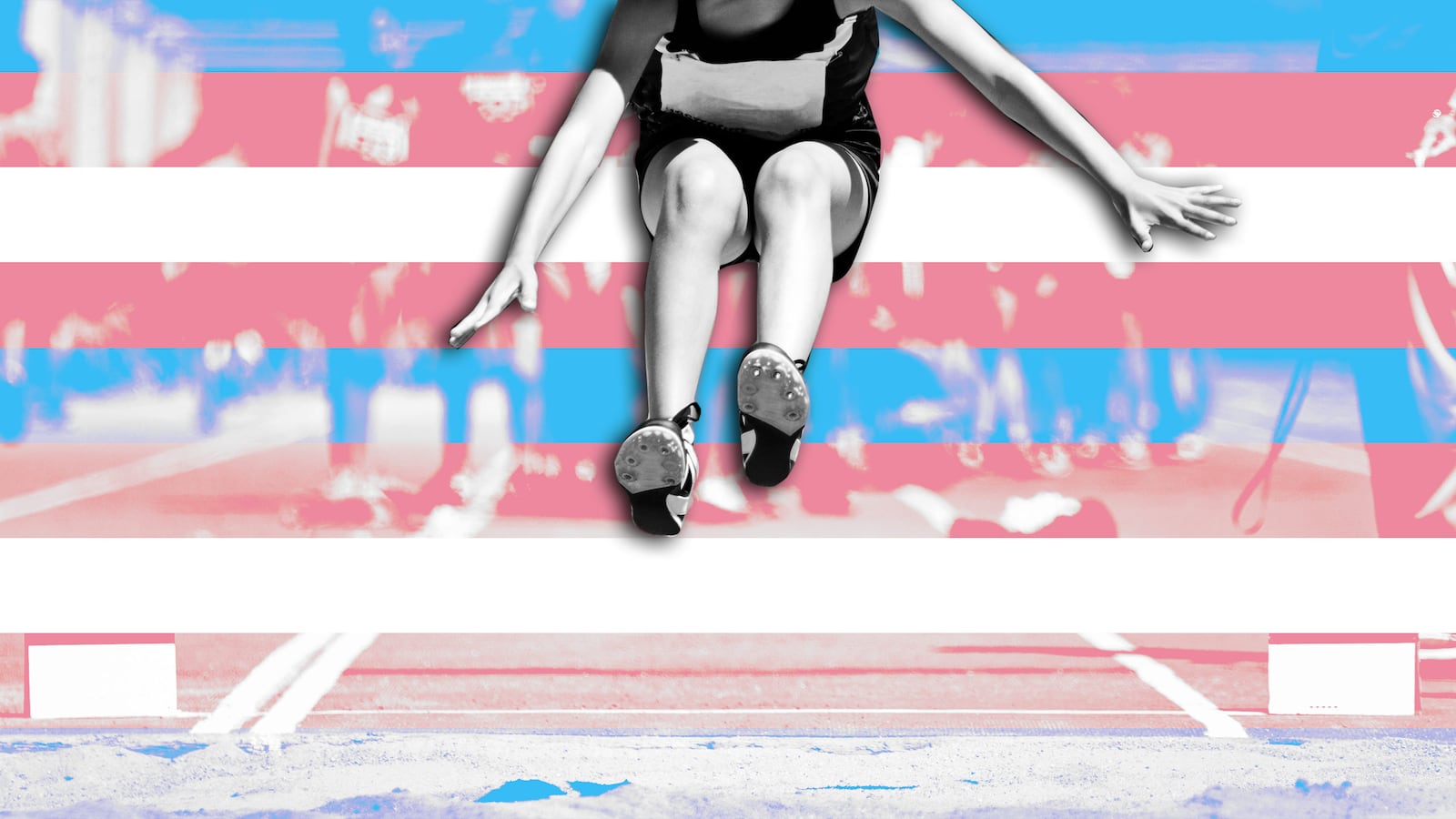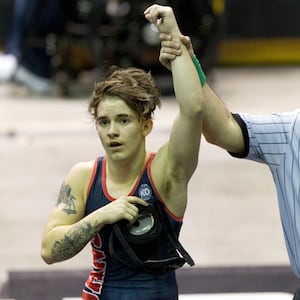Transgender rights and athletics have long gone hand in hand.
When North Carolina passed an anti-transgender “bathroom bill” in 2016, it was in large part the prospect of losing NCAA championship games that prompted legislators to revise the law the following year.
But now, some lawmakers in South Dakota are trying to use sports as a weapon against transgender people in a bill that LGBT advocates warn could spawn a wave of copycats.
“It’s really concerning that it’s so specific,” Chris Mosier, the first transgender athlete to compete on a U.S. national team, told The Daily Beast of South Dakota’s SB 49, which would restrict participation in high school athletics by birth certificate. “It could be the first domino in many discriminatory policies.”
The South Dakota bill was introduced on January 14 and is scheduled for a hearing in the State Senate Education committee on January 24. As the Associated Press reported, the sponsor of SB 49 modeled it after restrictive athletics policies in Texas—the same state where transgender boy Mack Beggs was controversially forced to wrestle in girls’ tournaments because his birth certificate lists him as female.
The bill would also overturn a 2015 policy in the state that “allows participation for all students regardless of their gender identity or expression,” as outlined in in the South Dakota High School Activities Association’s guidelines.
Mosier, who tracks policies for transgender student athletes on TransAthlete.com, told The Daily Beast that South Dakota’s current policy is one of the best in the country.
“It’s disgraceful, quite honestly, to go from one of the leading policies for inclusion to one of the most hurtful and harmful for transgender youth,” he said.
As advocacy groups like the American Civil Liberties Union work to squash SB 49—after having already fended off bathroom bills and other attempts to restrict transgender student athletes in previous legislative sessions—they are also keenly aware that it could be the start of a much longer national fight around this issue.
Now that Governor Dennis Daugaard, who famously vetoed a bathroom bill in 2016, has been succeeded by Gov. Kristi Noem, who said she would have signed it, LGBT advocates fear that SB 49 could pass—and thereby embolden anti-LGBT groups.
“Obviously if they’re successful in passing that bill in South Dakota, it will then of course become a model for other states,” ACLU staff attorney Chase Strangio told The Daily Beast. “This is what we’ve seen in other anti-LGBT contexts.”
Indeed, when it comes to “bathroom bills,”Religious Freedom Restoration Acts, or laws targeting adoption by same-sex couples, the typical anti-LGBT strategy has been to replicate the same exclusionary legislation across multiple states.
Recently, as the Human Rights Campaign noted in 2018, anti-LGBT groups have turned away from more “sweeping” legislation, which would be all but guaranteed to generate nationwide outrage, toward more “sector-specific” bills that are narrower in focus.
That shift in strategy has proven successful in getting anti-LGBT adoption measures passed in Kansas and Oklahoma.SB 49’s narrow focus on transgender high school athletics is also in keeping with that trend.
“They failed to get a ‘bathroom bill’ passed in the past three legislative sessions, and so this is the latest manifestation of that animus,” Strangio told The Daily Beast. “They’re zeroing in on athletics and extracurricular activities but it’s really the same sort of animating dislike, distrust, and disgust with trans students.”
Even the bill’s sponsor, Republican State Senator Jim Bolin, has tried to distance SB 49 from the failed “bathroom bills” of years past, telling the Associated Press, “This has only to do with the eligibility for athletic competition.”
That finely-honed focus only heightens concern among LGBT advocates that SB 49 would quickly fall off the national radar if passed.
“I don’t want to see that happen here, where you see [anti-LGBT groups] zeroing in one specific context and [then] people lose interest,” Strangio told The Daily Beast.
Going after transgender athletes is particularly cruel, LGBT advocates say, because participation in sports can have powerful positive effects for a vulnerable group of people who already face striking physical and mental health disparities.
“Participation in sport, I think, offers unparalleled physical, social, and emotional growth,” Hudson Taylor, executive director of the LGBT athletics organization Athlete Ally, told The Daily Beast. “Legislation like SB 49, which restricts access for trans athletes, is really denying the trans community those benefits of sport.”
Taylor, who has spent years advocating around this issue, is familiar by now with all of the anger and outrage that transgender participation in athletics can invoke. For one, Taylor says, sports is “a sex-segregated space” and “one of the preeminent spaces in society that is teaching concepts of masculinity”—so when transgender people begin to participate more visibly, he says, “the knee-jerk reaction is anger.”
But there’s also a through line, Taylor believes, between the “protecting women” rhetoric that “runs through a lot of anti-trans policies” like “bathroom bills” and the ostensible justification for policies that would keep transgender people out of sports.
In other words, anti-LGBT groups invoke the specter of a male student dominating a girls’ sport to generate fear around transgender participation in athletics . (In fact, as this reporter previously noted for The Daily Beast, many who read Mack Beggs’ story reacted as though Beggs were a transgender girl competing in a girl’s category, and not a transgender boy who was required to compete in a girl’s category by the very policies aimed at barring transgender participation.)
Although experts generally recommend that athletics associations take hormone levels into account at the college level and beyond, they suggest that transgender athletes at the K-12 level be allowed to compete in accordance with their gender identity without requiring medical treatment.
That was the conclusion of the 2010 “On the Team” report, co-developed by the National Center for Lesbian Rights, which determined that “a growing number of transgender youth are undergoing medically guided hormonal treatment prior to puberty” anyway, “effectively neutralizing” concerns about competitive fairness—and furthermore, that the range of physical variation among youth is so broad as to make it a non-issue.
“I think at the youth level, we just want young people to participate,” said Mosier. “We want them to move their bodies. We want them to have the experiences that come along with being on a team and working with their peers.”
In fact, as TransAthlete.com notes, 18 states currently have an inclusive policy in place for K-12 athletes—and the only national controversy around transgender high school athletics that has erupted to date has been the result of an anti-transgender policy. Bills like SB 49, LGBT advocates warn, will only cause, not solve problems.
What policymakers should be concerned about, they say, is ensuring that every young person who wants to play a sport can find an entry point. That was the sentiment NBA player Reggie Bullock of the Detroit Pistons expressed in his own call against the South Dakota legislation.
Bullock’s transgender sister Mia Henderson was killed in 2014 and he has since become an outspoken advocate on LGBT issues, as Vice recently noted in a documentary on the player. Bullock’s story is a reminder that sports can be an engine for change; in the face of SB 49, LGBT advocates want it to stay that way.
“Sports is a powerful tool,” said Taylor. “It can definitely move the needle in some substantive ways. But I think it’s also now a major target for legislators to come at an issue in a way that they haven’t before.”







